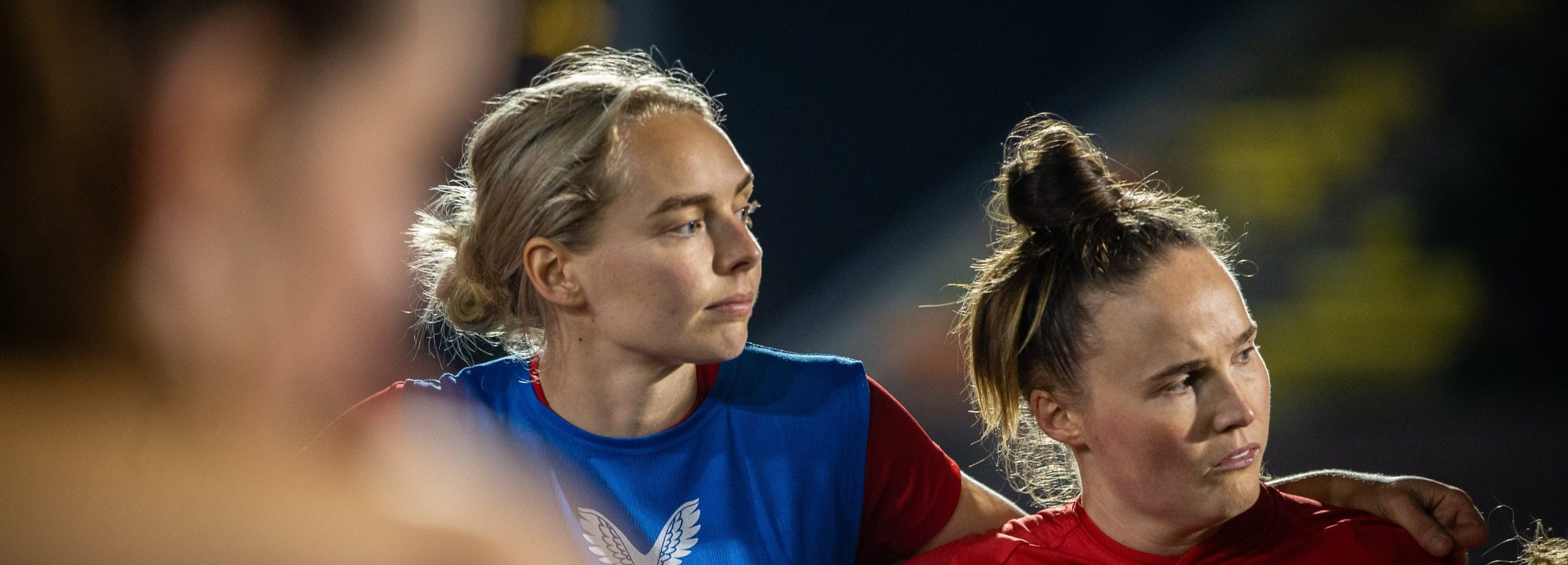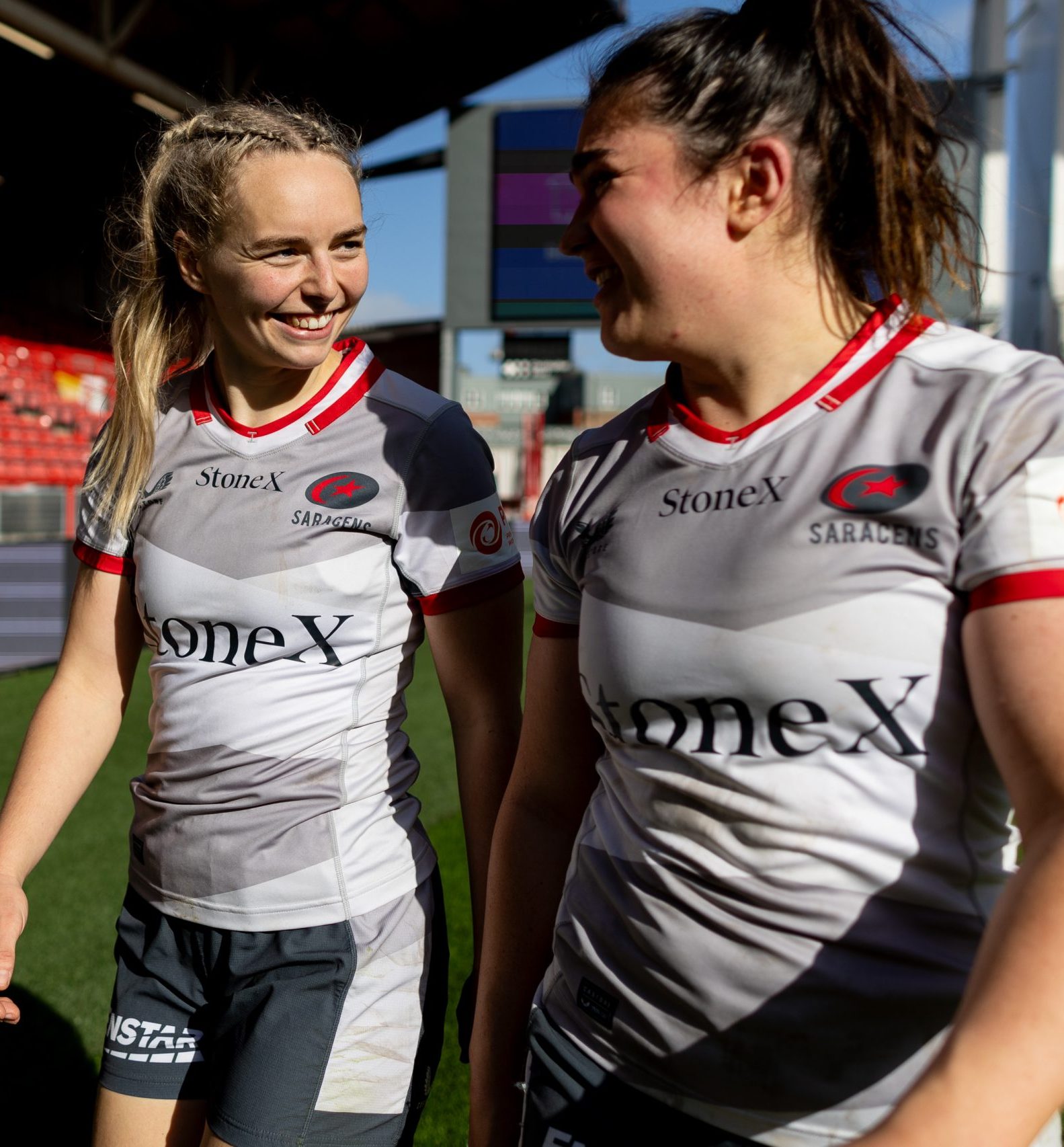Emma Hardy Tells Her Story


As part of raising awareness for Mental Health Awareness Week, Women's Community Engagement and Senior Sales Executive and current Saracens player Emma Hardy spoke to the club about the challenges she's faced across her life and career.
Emma Hardy’s speech slows. She had been talking at pace about how much she has enjoyed her most recent season with Saracens, how she has loved the last twelve months, and how even the heartache of losing the final at home to Gloucester Hartpury could not dim the sunshine she currently feels in North London.
But now, she moves uncomfortably in her chair as she is taken back, shifting from side to side as though an uncomfortable weight now lies across her shoulders. A difficult subject is brought to the fore. A stretch of time when she wasn't quite herself.
“Back in 2018, I got given a contract with England 7s, and looking back, I probably wasn’t good enough. The group they had included top quality players. It’s something I struggled with, as I’d always been pretty good for my age. But that team was stacked, and I was probably at the bottom of the pile. Self doubt started to eat me up, it was an alien feeling and probably led me to start falling out of love with the sport.”
“Returning from England back into that Loughborough set up, I became probably one of the most unbearable people to train with. I was aggressively competitive and unfairly harsh on others, using the excuse that I was trying to be clear with my communication, but in reality I was just taking my frustration out on others.”
“It affected my abilities, but I kept being selected despite not playing well. I got way too comfortable and ultimately felt unfulfilled.”
“It really started to affect me mentally, and I didn’t enjoy the sport anymore. I asked myself, ‘Is this what you want to do? Or are you just here because rugby is your identity, and you don’t have anything else?’”
Hardy speaks with clarity, a smile occasionally crossing her face as she remembers the position she was in. But she also remembers the confusion, the lack of understanding she had of the situation, and how countless wrong decisions were made.
“We had a new coach join at my previous club, and I thought I’d give it another crack. I thought, ‘It’s my home club, I can’t leave now, maybe it’s different, let’s give it one more shot.’”
“But I wasn’t ready. I was already so done with it and so unfulfilled. I tried to fake motivation and show some passion, but it did the opposite.”
“Then it started to seep into my personal life, that’s when I really noticed a drop in my form.”
As a young talent (she was playing Premiership Rugby at 17), the label of rugby player was useful. It gave her direction, purpose and meaning. But by comparing herself directly to other quality players, her identity then became a force for bad.
“I only saw myself as a rugby player, and I wasn’t playing rugby. It left me quite directionless. It was no one’s fault, but it left me in a dark hole, and I didn’t know how to get out of it.”
“I had a massive identity crisis. It got to Christmas time, I hadn’t played any rugby. I stopped seeing people and going out, I wanted to be on my own all the time. I would go to work, leave, sleep, occasionally eat. I felt trapped with no direction. This happened for about a month.
It felt quite out of body, I don’t associate myself with it anymore and can barely remember it.”
Emma’s light came through her close friend, housemate at the time and fellow player Daisy Hibbert Jones.
“I do remember one day, Daisy just said to me, ‘I think you’re depressed.’”
“That’s when the penny dropped. I decided to get some professional help and figure out where I was in my life and try and get back on track. I tried to give rugby another go, I was drafted in late on to a game after a few injury dropouts. But again, deep down I knew I didn’t want to play.”
“Unsurprisingly to me I played awfully, couldn’t string anything together and rugby just pushed me further back down that hole.”
“I then read online about a female footballer who was in a similar position to me, not getting played or enjoying her sport, was also working for the club she played for on not much money, who decided to take her own life. I felt the weight of that story.”
Emma Hardy has just completed her favourite rugby season yet, as she sits looking out across the StoneX in North London, her adopted home from the start of this campaign. The Yorkshire born centre reminisces on what has been a superb debut campaign in Saracens colours.
“I’ve loved the last 12 months here, to get to a final and play it in your stadium is something that doesn’t come around very often. Despite not getting over the line in the big one it meant we had two massive games (the semi final and final) here, both of which I was lucky enough to start in. I’ve just enjoyed it so much.”
But rugby and enjoyment haven’t always gone hand in hand for Hardy. The game has dealt her tricky hands at times. Starting in her youth in a rugby enthused home in York, Emma moved to Loughborough College at the age of 17, a place where she felt was her sporting calling.
“Up until then in my life I felt as though my purpose was to play sport, more specifically rugby. So going to Loughborough, the home of sport in the UK, made a lot of sense. I wasn’t particularly academic at school, if I hadn’t gone to college then I probably would’ve stayed in the same village my whole life.”
And it wasn’t long before Hardy really started to make waves. Within weeks of joining the college, Hardy was starting in Premiership games, a rare feat at the start of the new era for the women’s top flight.
“I started in the first game of the new Premiership era against Worcester. I got a team yellow card and cried in the dugout. It was a comical debut.”
Despite the tough start, Emma took to elite rugby well, playing almost every game of her debut season. For the teenager it felt as though rugby just couldn’t go wrong.
“I felt as though everything was very easy. I went from starting Premiership games at 17 to being offered a professional contract with England 7s a year later. I was confused as to what the fuss was all about with being a professional athlete, it felt like it was all pretty plain sailing.”
“I was part of a pretty special generation of young players who were rising through the ranks quite quickly. We were probably one of the first groups of players that were offered elite coaching through our age grade years which showed. It had gone from nothing being available to having loads of resources.”
To chat with Hardy is a delight. People who share a pitch with her feed off her passion for the game, and that comes across in conversation. However, that passion was tested to its limits during her early twenties. She had to let go of rugby.
“I think the coach was quite confused when I told him, but ultimately understood. He told me I could have one last game if I wanted, I reluctantly agreed. It ended up being my most enjoyable game in half a dozen years. I was incredibly grateful for the opportunity to have a send off from a club that had meant a lot to me, but I also felt relieved. I was done. I was free. Rugby stopped hurting me. I was at peace with the fact I wasn’t going to play anymore.”
It wasn’t the most typical of paths, but Emma had finally realised that rugby wasn’t the be all and end all. She had stopped playing, but the world kept spinning. However, now it was time to choose a new path.
“I knew I probably needed to leave Loughborough. It wasn’t a bad place, but I had been through something bad there, so I saw it differently now, and a lot of my friends had moved down to the North London area. I decided I would follow.
I quit my job and moved down here and joined the Foundation at the club. I had no intention of playing when I originally joined. Rugby coaching was all I knew how to do and all my friends were here. It just felt like the most straightforward option for me.
But ultimately, I was bored. I was spending a lot of time running, but that wasn’t scratching that itch. Alex reached out to me to see if I wanted to come to a training session. I spoke to my dad about it, who’s always been my biggest supporter, and he told me to give it a go. So, I did.”
One training session turned into a week, which turned into preseason, which turned into signing on with the club ahead of an incredible PWR campaign, in which Hardy was at the forefront of many successes.
“There were no expectations. The coaching staff here were very conscious of my rugby journey to that point. I can’t pretend it didn’t feel weird. Putting on a kit that wasn’t purple, training at the StoneX, what I always perceived as enemy territory. Slowly but surely though, it allowed me to fall back in love with the game.”
It is not the path Hardy was expecting to travel. She did admit she saw herself as being a one club player. But adversity is inevitable in the game, and overcoming that proved a challenge. But the lessons learnt during her tough times have proved invaluable.
“I think I’ve just learnt that it’s okay to be stuck and unaware of what’s next. Rugby has thrown up so many challenges that in the end I have managed to overcome and learnt so much with. To think back at the person I was five years ago to now, I honestly can’t believe I’m still the same person.
I was also really grateful to have a support network around me during my tougher times. Friends and family got me through that period and I’ll forever be indebted to them. If I hadn’t had that conversation with Daisy I’m not sure what would’ve happened.”
Emma smiles, her shoulders are raised as if they weigh far less than they did when she sat down. She awaits the next time she will grace the StoneX surface. She’s excited to play rugby again; something at one point she thought would never cross her mind.

























